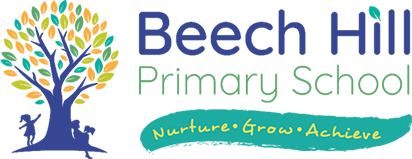Online Safety
Keeping Your Child Safe Online
At Beech Hill Primary, we recognise that the majority of our learners are all using the internet through a variety of different platforms. Online safety is an integral part of our children’s education in today’s digital world and is embedded in their learning at school.
Protecting Children Online - Advice to Parents Carers
Cyberbullying tips for parents and carers
Online Relationship Guide For Parents
Useful Websites
thinkuknow - by the National Crime Agency - Child Exploitation and Online Protection command (NCA-CEOP) provides resources for parents and carers and children of all ages to help keep children safe online.
childnet - has developed guidance for parents and carers to begin a conversation about online safety, as well as guidance on keeping under-fives safe online
parentzone - is a collaboration between Parent Zone and NCA-CEOP, providing support and guidance for parents and carers related to the digital world from leading experts and organisations
nspcc - has guidance for parents and carers to help keep children safe online
saferinternet - provides tips and advice for parents and carers to keep children safe online - you can also report any harmful content found online through the UK Safer Internet Centre
The CEOP (Child Exploitation and Online Protection Centre) - YouTube channel has some excellent videos about their latest campaigns and how to report items to sites such as Facebook, Twitter and Instagram
Vodafone - Vodafone have lots of fantastic practical advice for parents. You can also read their 'Digital Parenting' magazine.
kidsmart - An award-winning internet safety programme for children.
familylives - Information and advice about bullying for children, parents and schools.
kidscape - An organisation which helps to prevent bullying and child abuse.
childline - ChildLine is the free helpline for children and young people in the UK
Online Safety at Home
We would like to share advice with parents and carers so that you can keep your children safer online at home.
Setting ground rules
- Discuss and agree, as a family, how learners should be using the internet at home, with the aim of ensuring that any access is appropriate to your child’s age and ability.
- Ask your children what they think is and isn’t acceptable to do online, then add your own rules and boundaries to that list.
- Decide what information should not be revealed online, such as contact information and photos. Agree rules for making and meeting online friends.
- Set clear boundaries relating to webcams, video chat, live streaming and live voice on different devices. Even when children are talking to people they know, they can still encounter risks.
- Explore how to create strong passwords and discuss how to keep them safe, e.g. not sharing them with their friends or using the same password for several accounts.
- Try writing down “ground rules” as a visual reminder Click here for a template “family agreement”.
- Remember these are whole family rules, so consider your own use of the internet and lead by example.
- Share quality time together. Consider nominating ‘tech-free’ areas or times, such as your child’s bedroom or dinner time, where you can give each other undivided attention and share offline experiences, like reading a book together.
Parental Control
- Install antivirus software and secure your internet connection.
- More advice on online security can be accessed here.
- Make the most of the parental controls on your children’s internet-enabled devices and games consoles to help restrict inappropriate content. They can also help you manage how much time your child spends online.
- Do your research and select the tools which are most suitable to you, your child and the technology in your home. Find more information on parental controls at: www.internetmatters.org and www.saferinternet.org.uk/advice-and-resources/a-parents-guide
- Set up filters on internet search engines.
- Ensure your child understands that parental controls are in place to protect them, not restrict them. Some children will actively work around parental controls if they feel constrained without knowing why.
- Read parental guidance and safety recommendations for games, apps or websites before allowing your child to use them.
The following guides provide balanced information to help you make informed decisions:
Be aware that parental control tools and filters are not always 100% effective and you can’t rely on them alone to protect your child online.
PEGI Age Ratings
Age ratings are systems used to ensure that entertainment content, such as games, but also films, tv shows or mobile apps, is clearly labelled with a minimum age recommendation based on the content they have. These age ratings provide guidance to consumers, parents in particular, to help them decide whether or not to buy a particular product for a child.
The PEGI rating considers the age suitability of a game, not the level of difficulty. A PEGI 3 game will not contain any inappropriate content, but can sometimes be too difficult to master for younger children. Reversely, there are PEGI 18 games that are very easy to play, yet they contain elements that make them inappropriate for a younger audience.
Here are some popular apps/ platforms and their ratings;
|
Platform |
PEGI Rating |
|
|
13 |
|
|
13 |
|
|
16 |
|
Youtube |
18 (13 – 17 with parental consent) |
|
|
13 |
|
Snapchat |
13 |
Gaming Information Posters
- Among Us
- Call of Duty - Modern Warfare
- Call of Duty - Black Ops 4
- Games Consoles
- Nintendo Switch
- Playstation 5
- Roblox
- Xbox Series X
Social Media Posters

